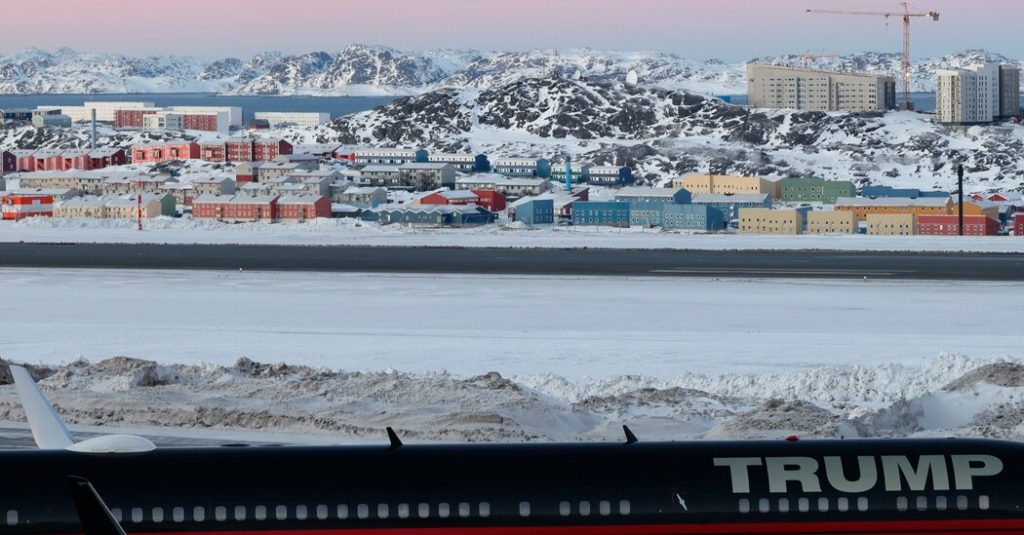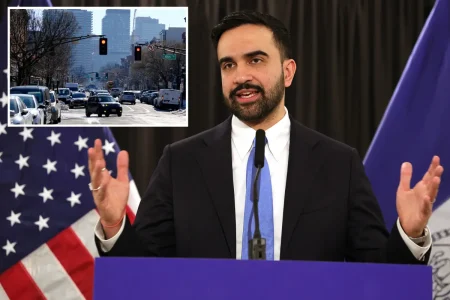Here’s a simplified, conversational summary of the Greenland situation:
—
You know how diplomatic phone calls are usually buttoned-up and formal? Well, imagine Donald Trump making it anything but. Just five days before his presidency officially began in January, Trump reportedly had a pretty heated phone call with Denmark’s Prime Minister, Mette Frederiksen. The topic? Greenland. Yes, Greenland—the massive, icy island that belongs to Denmark but boasts a strategic location as Arctic ice melts and opens up new shipping lanes. Trump wanted the United States to essentially buy it, but Frederiksen firmly told him, “No, Greenland is not for sale.”
According to European officials who were debriefed (but spoke anonymously), this 45-minute call wasn’t a warm or fuzzy chat. Trump was insistent, while Frederiksen tried steering the conversation toward better military and economic cooperation between the U.S. and Denmark. Still, she reiterated that Denmark isn’t putting a price tag on Greenland, which already hosts an important U.S. military base.
From a European perspective, this Greenland situation had everybody talking—and worrying. In places like Davos, Switzerland, where world leaders gathered last week for the annual World Economic Forum, rumors swirled about this call, along with general unease over what a second Trump presidency would mean for Europe. Trump’s focus on Greenland raised eyebrows, especially as he doubled down, reportedly saying that U.S. control of Greenland was “an absolute necessity” for Western security.
Denmark, understandably, is trying to de-escalate things. They’ve been urging their allies in the European Union to keep the Greenland topic low-key for now, probably hoping the situation doesn’t snowball into something more problematic. But behind the scenes, there’s tension. If Trump starts pushing Denmark through economic means, like tariffs, Europe is bracing to push back, possibly with countertariffs—an example of how this spat has global ramifications.
Denmark’s approach so far has been diplomatic. For instance, their foreign minister, Lars Lokke Rasmussen, recently had what he called a “constructive” 20-minute call with the new U.S. Secretary of State, Marco Rubio. Talk centered on Arctic cooperation, overall security, and other issues like Ukraine—but Denmark seemed careful to downplay any direct friction over Greenland. Prime Minister Frederiksen’s office also issued a vague statement after her January phone call with Trump. It avoided mentioning any disagreements and instead spotlighted Denmark’s willingness to boost Arctic security and investment, while also reaffirming Greenland’s autonomy in deciding its future.
Here’s the kicker: Greenland doesn’t belong to Denmark in the same way a state belongs to a country. Greenland is autonomous, which means it governs itself in most areas but leaves defense and foreign policy with Denmark. It was a colony until 1979, but today it has its own Parliament and could technically declare independence—provided its citizens vote for it during a successful referendum.
And this is where things could get sticky. Trump might not just want to literally “buy” Greenland. There’s some speculation that he could try to nudge Greenland’s citizens toward voting for independence, knowing they might be incentivized to link themselves more closely to the U.S. Greenland has a small population of roughly 60,000 people, so any major investment drive could sway opinions and further complicate Denmark’s stance.
Meanwhile, Denmark’s focus remains on keeping the peace and figuring out what Trump actually wants. Is this about tapping into Greenland’s economic resources? Or is it primarily a matter of military strategy? Experts suggest Trump’s motivations now lean more toward the latter—thinking of Greenland as a key Arctic stronghold, especially with Russia and China expanding their presence in the region.
Interestingly, Trump isn’t new to the Greenland obsession. Back in his first term, he famously floated the idea of purchasing the island, though at the time it seemed more like a bizarre real estate pitch. Now, however, European analysts are taking him very seriously. A former Danish ambassador even noted that Trump’s comments this time around seem “carefully prepared,” suggesting there’s a more deliberate geopolitical strategy in play.
The European Union also finds itself in a bit of a dilemma with this Greenland saga. Protecting Denmark and Greenland’s sovereignty feels non-negotiable because any signs of weakness might hurt the EU’s credibility on the global stage. As one expert put it, “Our credibility is at stake. The Danish want to keep a low profile, but that’s not how the world works.”
For Denmark, keeping calm is a balancing act. On one hand, they want to avoid pushing Trump into any aggressive moves, like tariffs, but on the other hand, there’s a palpable anxiety about his unpredictable decision-making. Danish officials are also feeling a bit cornered. While Frederiksen has repeatedly clarified that Greenland isn’t up for sale, it hasn’t stopped Trump from fueling speculation or making bold statements about how he thinks the U.S. will somehow “have it.”
At its core, the debate over Greenland represents more than just a quirky diplomatic spat—it’s a tug-of-war over Arctic dominance. The melting ice caps and emerging shipping lanes mean this once-remote, largely overlooked island is suddenly a hot property. And with Trump viewing Greenland through the lens of national security, the stakes are as much about geopolitics as they are about resources.
As this complex narrative unfolds, one thing remains clear: Greenland is stuck at the heart of an international showdown. Denmark, while treading carefully, could soon find itself having to choose between collaboration and confrontation—not just with the U.S., but potentially with other global powers eyeing the Arctic, too. While Greenland might not be “for sale” in a traditional sense, it’s certainly becoming a central piece in the global chessboard, whether it wants to be or not.
—
How wild is that? It’s fascinating to see how something like Greenland—barely on most people’s radar—has become such a hot topic of international discussion and tension. Who would’ve guessed the icy island could spark this much drama?








